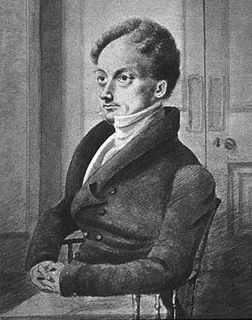A Quote by Thomas Malthus
The perpetual tendency of the race of man to increase beyond the means of subsistence is one of the general laws of animated nature, which we can have no reason to expect to change.
Related Quotes
The Laws of Nature are just, but terrible. There is no weak mercy in them. Cause and consequence are inseparable and inevitable. The elements have no forbearance. The fire burns, the water drowns, the air consumes, the earth buries. And perhaps it would be well for our race if the punishment of crimes against the Laws of Man were as inevitable as the punishment of crimes against the Laws of Nature -were Man as unerring in his judgments as Nature.
To suppose universal laws of nature capable of being apprehended by the mind and yet having no reason for their special forms, but standing inexplicable and irrational, is hardly a justifiable position. Uniformities are precisely the sort of facts that need to be accounted for. Law is par excellence the thing that wants a reason. Now the only possible way of accounting for the laws of nature, and for uniformity in general, is to suppose them results of evolution.
The laws of Nature take precedence of all human laws. The purpose of all human laws is one - to defeat the laws of Nature. This is the case among all the nations, both civilized and savage. It is a grotesquerie, but when the human race is not grotesque it is because it is asleep and losing its opportunity.
How shall we define occultism? The word is derived from the Latin occultus, hidden; so that it is the study of the hidden laws of nature. Since all the great laws of nature are in fact working in the invisible world far more than in the visible, occultism involves the acceptance of a much wider view of nature than that which is ordinarily taken. The occultist, then, is a man who studies all the laws of nature that he can reach or of which he can hear, and as a result of his study he identifies himself with these laws and devotes his life to the service of evolution.
To the mind which looks not to general results in the economy of Nature, the earth may seem to present a scene of perpetual warfare, and incessant carnage: but the more enlarged view, while it regards individuals in their conjoint relations to the general benefit of their own species, and that of other species with which they are associated in the great family of Nature, resolves each apparent case of individual evil, into an example of subserviency to universal good.
Seurat and Signac mixed paintings with the dry and abstract laws of science. This approach, in my opinion, usually strays from the purpose of art in general. Because it means that one cannot expect from an artifact, that is created with mathematical laws, to establish an improbable and irrational relationship between the work and the viewer.
As a race, the African is inferior to the white man. Subordination to the white man is his normal condition. He is not his equal by nature and cannot be made so by human laws or human institutions. Our system, therefore, so far as regards this inferior race, rests upon this great immutable law of nature.





































